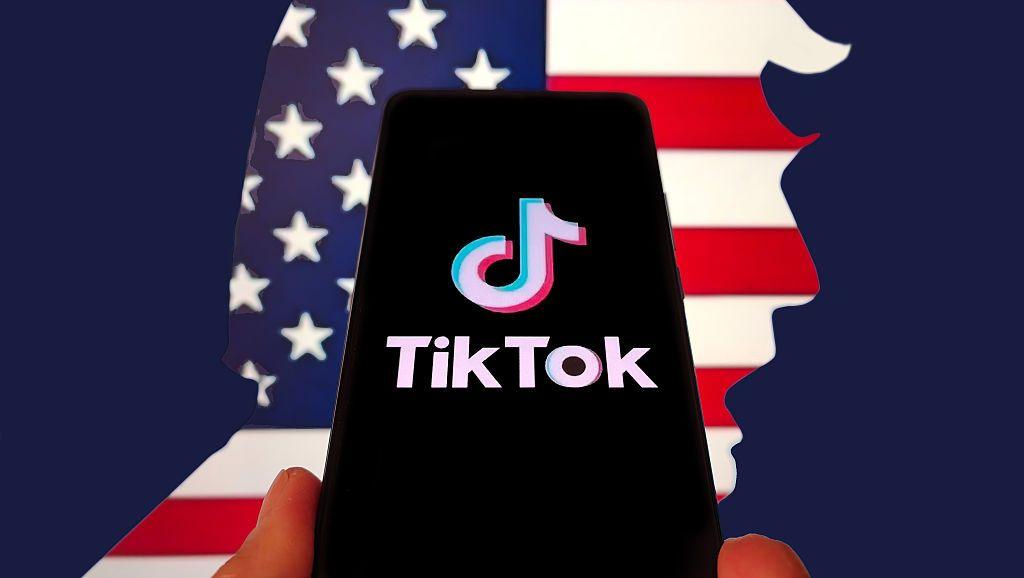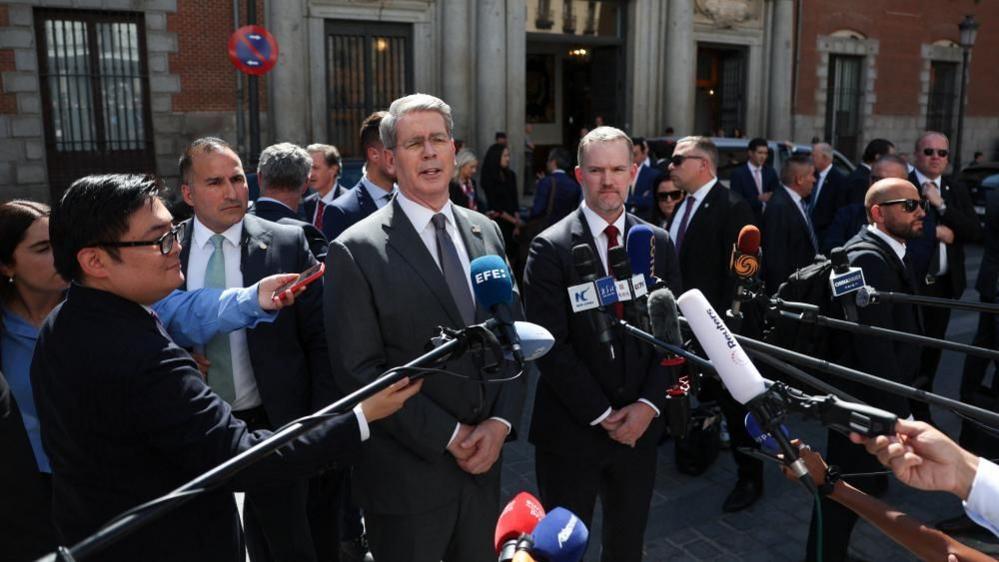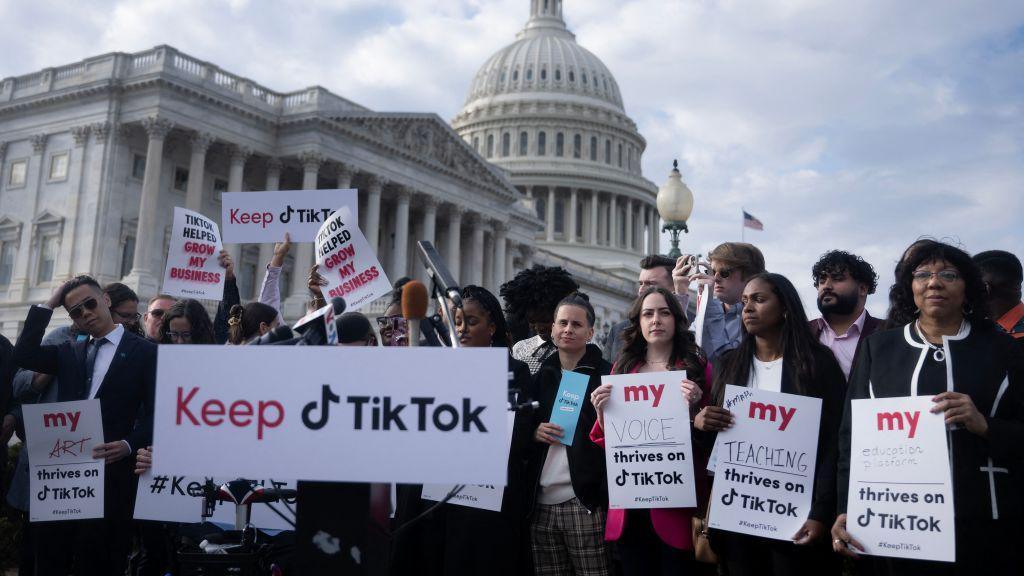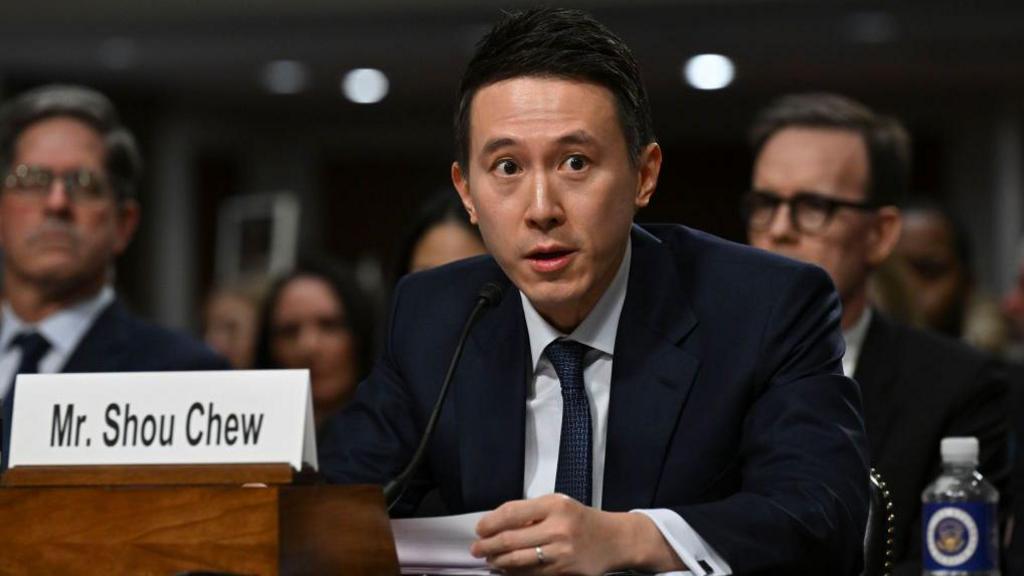China is calling a TikTok deal a win. What's in it for them?

- Published
A much-awaited deal over TikTok may be close, with US President Donald Trump and his Chinese counterpart Xi Jinping set to discuss terms on Friday.
Top officials from both sides struck a "framework" agreement this week, which reports suggest could see TikTok's US operations sold to a group of American firms.
If the deal goes through, it would be what one expert called a "rare breakthrough" in US-China trade negotiations - and one which settles an issue that has made headlines for years.
Experts have been telling the BBC what a final deal might look like for TikTok's 170 million US users, and what Beijing might get in return.
The US may not get the 'secret sauce'
Chinese state media is calling it a "win-win" for both countries, while Trump has said "I'd like to do it for the kids".
But a lot about "it" still remains unclear.
Reports suggest that American users would be offered a new US-specific version of the app. And that the US operations could be bought by a consortium that includes technology giant Oracle, and investment firms Andreessen Horowitz and Silver Lake. The BBC has contacted the companies for comment.
But what exactly is on the table? At the heart of the tussle is TikTok's algorithm - the "secret sauce" that recommends content to users based on their preferences and behaviours.
It's key because it drives the app's virality and appeal. Other companies have tried to re-create the algorithm - Instagram has Reels, YouTube has Shorts - but they are not as good, a former social media executive who worked for Snap and Viber told the BBC, speaking on the condition of anonymity.
"Generally, the one who introduces the technology just knows how to do it better."

US Treasury Secretary Scott Bessent speaking to media earlier this week
TikTok's Chinese owner, Bytedance, understandably refused to part with the prized formula, and Beijing backed the firm.
But in a twist few saw coming, China's top cybersecurity regulator has signalled that Beijing may allow ByteDance to license the algorithm and other intellectual property (IP) to a US company owner. But it will not be transferred outright.
It's a major departure from China's previous hardline stance over the algorithm.
But there's every chance the US version will run on a "stripped-down" version of the app's software, said computing expert Kokil Jaidka from the National University of Singapore.
Even limited access could reveal how the technology drives engagement, moderation and ad targeting - all the things that make the app so profitable, she adds.
"It simply doesn't make business sense for ByteDance to hand over its most valuable asset when a lighter version can keep the app running without giving away its edge."
But these changes will affect the user experience - the app may show less diverse content than users might see elsewhere, Dr Jaidka adds.
"A lighter, slower, more domestic version - while ByteDance keeps the crown jewels in Beijing."
The deal could still be a while away
The user experience will remain the same, and with "Chinese characteristics", according to US Treasury Secretary Scott Bessent, who is leading his side's negotiating team.
The "Chinese characteristics" may well be the problem though - that is, in fact, a phrase often used by the Chinese Communist Party to differentiate its way of doing things.
US officials, including Trump during his first term, have long raised concerns about who has access to TikTok's data, and the influence the app has over US users.
These questions over national security spurred legislation that former president Joe Biden signed into law last year, requiring TikTok to hand over control of its US operations or face a ban.
Trump has since changed his mind, crediting TikTok for boosting young voter support in his 2024 election win.
But a sale must still satisfy US lawmakers and allay the worries that kickstarted everything. Congress is likely to need to approve any agreement, and there is already political backlash in Washington on both sides of the aisle.
Republican lawmaker John Moolenaar has said he is concerned that the agreed framework could still allow Chinese government influence and control.
"Put simply: the statute requires full separation from 'foreign adversary' control, and a license would not appear to meet that test," lawyer Hdeel Abdelhady told the BBC.

The possibility of a ban on TikTok drew protests in the US when first announced
Deals of this size typically take months or even years to complete, and there are a number of issues to resolve.
For one, it is not clear how US-owned and operated TikTok would interact with TikTok elsewhere, which would be still be owned by ByteDance.
And two, ByteDance, being a private company, would need approval from its board for the arrangement to proceed.
That adds a layer of complication even if the Chinese government - which enforces export controls on advanced technologies like algorithms - has already approved the deal.
And the US president himself, who has proven to be an unpredictable trade partner, could create fresh complications.
Beijing buys time - and leverage
We know Trump is keen on a TikTok deal, and we know why.
It would be a big win for his administration. One in seven people in the world use the app, which also doubles up as a huge marketplace for buyers and sellers across the world, from the US to Germany, Indonesia to the Philippines.
"This is the only social media app that didn't originate in the US and so it's very valuable," the former social media executive said.
The average revenue per user for most social media apps in the US is five to 10 times higher than other countries, with America likely making up something close to 50% of ByteDance's overall revenue, he added.
Tech news site The Information estimated ByteDance's global revenue to be $39bn (£28.6bn) in 2024, with TikTok accounting for $30bn.
What we don't know yet is how China would gain from such a deal.
The licensing deal will allow ByteDance to keep its algorithm under wraps - a strategic advantage if the US ever intends to launch new apps to compete with those already operating in the country, said computer scientist Ben Leong.
And rather than be banned, TikTok gets to stay in the US market. TikTok's parent would also retain the single biggest stake in the app, along with the logo, format and branding.

TikTok CEO Shou Zi Chew has appeared before the US Senate to answer questions about national security concerns
The deal also creates a "TikTok Template" for other Chinese companies to deploy their technology in the US through licensing, investor and tech expert Kevin Xu wrote in his recent newsletter.
He added that ready-to-go Chinese technologies that matter to national competitiveness, like batteries and rare earths, could now flow to the US more easily.
"This is the formula that will likely be applied should, say, BYD want to make a jump into the US market, or CATL want to step up its expansion to supply more US carmakers with its batteries."
China can spin the deal as a win - it is exporting Chinese-made tech on its own terms. And that might be critical leverage for Beijing in trade negotiations with Washington.
"The Chinese side have called the talks in depth, constructive and candid. That signals that they are actually quite happy with how things are going," said former World Bank Country Director for China Bert Hofman. "Question is when will there be a full deal?"
A TikTok deal could buy them time for exactly that. The US is a huge export market for China, and China is a major buyer of American agricultural goods. High tariffs would hurt both. There are also export controls on both sides, especially restricting US access to rare earths, which China has a near monopoly over.
Ultimately, it seems a breakthrough on TikTok is progress for China. The US may get a deal, but perhaps not the coup Trump had in mind.
"The deal might work on paper - but in practice, it will always sit under a cloud," Dr Jaidka said.
"A US TikTok will look like the same app, but behind the scenes it will run on borrowed code, firewalled data, and political trust that could vanish overnight."